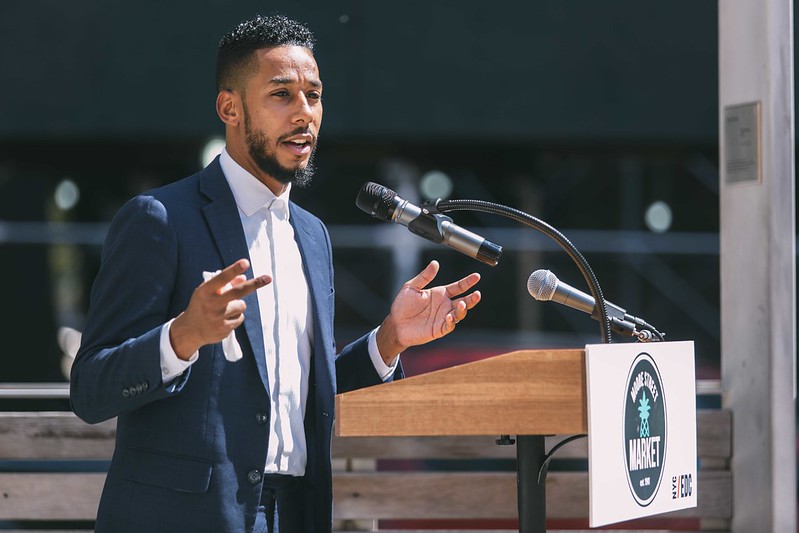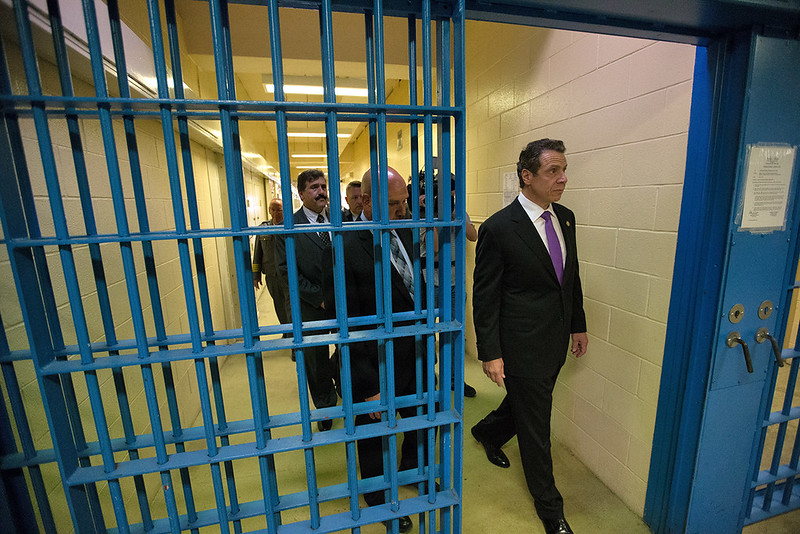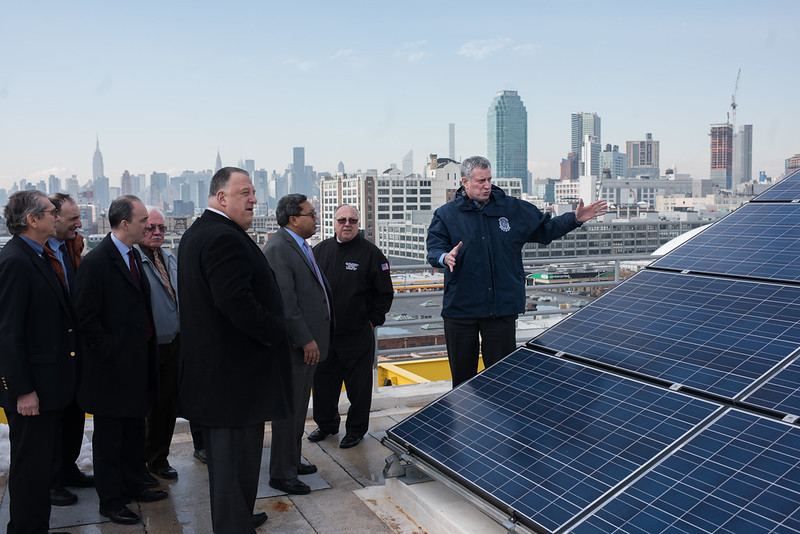The Coronavirus Crisis Reinforces the Climate Emergency, Our City Budget Must Recognize That

City Council Member Antonio Reynoso, the author (photo: Emil Cohen/City Council)
These months will go down as one of the most trying periods in our city’s history. We are consumed by the grief of lost loved ones, colleagues, and neighbors, while facing a level of economic uncertainty not seen in generations. In this moment of crisis, many of us feel compelled to put on blinders and focus solely on addressing the present situation, and there is no doubt that efforts to combat COVID-19 will require vast resources and attention from our best minds.
As with many other issues confronting our communities, the impacts of COVID-19 are exacerbated by a broad array of societal problems, particularly environmental degradation and injustice. We must take a comprehensive approach to fighting this disease, one that not only looks to meet our short-term needs, but puts forth solutions that greatly improve our public health and economic resilience to prevent and withstand future emergencies. This starts with protecting our environment.
Research is now showing that communities most impacted by pollution, predominantly black and brown communities, have higher rates of infection and death from COVID-19. This should come as no surprise. The virus impacts the respiratory system; high levels of pollution lead to increases in respiratory illnesses, which leave the body less equipped to fight off the virus. With this knowledge in hand, one would expect our leaders to double down on environmental initiatives to improve our air quality.
However, following the pattern of past economic downturns, environmental programs are among the first to see budget cuts, allowing elected officials to crow about a balanced budget, while their constituents are left vulnerable to future catastrophe.
In June of last year, the New York City Council officially declared that we are in a climate emergency. COVID-19 has not displaced this emergency, which worsens by the day. And yet, the proposed cuts in the Mayor’s recently-released Executive Budget directly target concrete initiatives that would mitigate effects of climate change: suspending the city’s organics program, which will lead to increased methane emissions, and disinvesting from building bike lanes, making it harder for people to use alternative modes of transportation at a moment when people are more hesitant than they’ve ever been to ride public transit. Environmental initiatives, like a robust organics program and network of bike lanes, are not just necessary components of a well-functioning, modern municipality, they are also basic elements in any plan to mitigate an environmental catastrophe and improve public wellness.
The scope and scale of both the public health and economic costs of climate change have the potential to dwarf what we’ve witnessed during the immense coronavirus crisis. Future generations would be left to deal with rising sea levels, longer and more frequent heat waves and droughts, and poor air quality. The results will be tragic; millions living in low-lying areas will be displaced from their homes, food and water shortages will occur, and deaths from heat and respiratory-related illnesses will skyrocket.
Responding to the twin emergencies of COVID-19 and climate change can seem overwhelming, but it presents a critical opportunity to improve our public health, revive our economy, and create greater equity within our communities. This is precisely the time to make investments that better prepare us for the next emergency. But before we can make further environmental investments, we must stop divesting in the limited number of environmental initiatives already on the books. We must protect and accelerate progress already underway.
As we watch the coronavirus curve flatten, we should not be thinking about how we “get back to normal” – normal is what left us unprepared, normal is what led to people of color dying from the virus at greater rates, normal is what left low-income folks completely devastated by the economic downturn.
We must rebuild our communities with equity and resiliency top of mind. This is not the time to follow the Republican orthodoxy of austerity; this is a time to figure out how we can prevent future large scale crises, like the looming climate crisis. Our goal should be a green economy, allowing us to reduce pollutants -- improving public health and mitigating climate change -- all while putting people to work building solar panels, processing compost, growing food locally, and in myriad other vocations.
We can start by preserving the environmental initiatives we already have. If we do not rise to tomorrow’s climate crisis with the necessary urgency, the coming decades will bring cascading crises that no government will be equipped to respond to.
***
City Council Member Antonio Reynoso represents parts of Brooklyn and Queens. On Twitter @CMReynoso34.
***
Have an op-ed idea or submission for Gotham Gazette? Email This email address is being protected from spambots. You need JavaScript enabled to view it.
The State Legislature Claims To Be Co-Equal, So Why Is It Letting The Governor Block Popular Solitary Confinement Restrictions

Gov. Cuomo at a correctional facility (photo: governor's office)
On April 3, New York Governor Andrew Cuomo rammed through a budget that will be devastating to New Yorkers and then on April 4 declared that the legislative session was “effectively over” for the year. Several legislators immediately pushed back.
Comments from legislators on social media ranged from “Hell no” to “King Cuomo seems confused” to “Oh cool. So now there’s just one branch of government?” Assembly Speaker Carl Heastie immediately issued a statement in response, emphasizing the Assembly as a “co-equal branch of government” and stating that the session is not over and that they established a system of remote voting. Senate Majority Leader Andrea Stewart-Cousins had previously stated that they “intend to continue to do our work,” that they had set up a system to do so remotely, and that the Senate and Assembly are “co-equal branches” with the Governor.
While there are many ways that the Legislature can, and must, exert its authority as in fact a co-equal branch of government and show that New York has a functioning democracy with an independent legislature, there may be none as obvious or urgent as passing the HALT Solitary Confinement Act, (S.1623/A.2500), which has majority support in both houses. Among other provisions, HALT would end all forms of solitary confinement beyond 15 days, in line with international standards on torture, and create more humane and effective alternatives.
Every day that the Legislature fails to enact HALT means thousands of people - overwhelmingly black and Latino people - suffering, deteriorating, and too often dying in solitary confinement. Every year that goes by without legislators having an opportunity to vote on the bill means tens of thousands of New Yorkers being locked in six-by-nine cages and tombs.
This practice of inhumane torture has gone on far too long. Solitary causes such deterioration and intense suffering that self-mutilation is a regular known outcome. Solitary is associated with increased rates of heart disease, psychosis, and death -- while people are in solitary and when they return home to the outside community. I am a solitary confinement survivor and the collateral damage from my time in solitary still affects me today.
While the United Nations has deemed any length of time in solitary as torture in some circumstances and solitary beyond 15 days as torture in any circumstances, New York regularly holds people in solitary for months and years, and sometimes for decades. In the words of some New York legislators themselves, “That is wrong. It is cruel. It is inhumane. It must stop.” “I can think of no practice more inhumane than solitary confinement.” “It has no business in the state of New York.” “What should have happened already, we are demanding a vote.” “I wanna vote for that damn bill now.”
HALT currently has 34 Senate co-sponsors (a majority is 32) and 79 Assembly co-sponsors (a majority is 76), and many additional legislators in both houses have committed to vote for the bill. A wide range of legislators -- from Long Island to Syracuse to New York City -- have been vociferously and relentlessly calling for HALT to be brought to a vote. There is not another bill in the Legislature that has this number of co-sponsors and this level of support.
Despite this widespread support and more than enough votes for passage, the bill has not yet been brought to a vote. In 2019, Governor Cuomo pushed the legislative leaders to not bring HALT to a vote and so they did not. In 2020, with all of the outcries of “pass HALT now” from legislators and community members across the state, now is the moment.
In a functioning democracy, with independent and co-equal branches of government, when a majority of legislators are ready to vote for a piece of legislation that piece of legislation must be brought to a vote, passed, and put on the Governor’s desk. It is long past time for a vote on HALT. Leadership must resume the legislative session remotely and bring HALT to a vote immediately.
***
Victor Pate is a survivor of solitary confinement and the Lead Statewide Organizer for the #HALTsolitary Campaign. On Twitter @mrvictorpate & @NYCAIC.
***
Have an op-ed idea or submission for Gotham Gazette? Email This email address is being protected from spambots. You need JavaScript enabled to view it.
On #EarthDay50, The Answer to Two Existential Crises is Staring Us in the Face

The future is renewable, the author writes (photo: Michael Appleton/Mayor's Office)
On this 50th anniversary of Earth Day—Wednesday, April 22, 2020—, the world is in crisis. An unbearable number of lives lost each day. Livelihoods disappearing or threatened. And the uncertainty of what might come next is disrupting communities. Our infrastructure is strained to the brink and our most marginalized communities are bearing a disproportionate brunt of the pain. I’m of course talking about the ongoing devastation of the COVID-19 pandemic.
The tragedy is that these disruptions are already equally true of our ongoing climate crisis. The impacts of climate change can be seen in the swarms of locusts ravaging East Africa, the wildfires that have raged across California and Australia, the heatwaves shattering records across the globe. And it came for New Yorkers when Hurricane Sandy roared ashore in 2012, the worst natural disaster New York City has faced. These climate disruptions will only be made worse and more chaotic in the reality of our new COVID-19 world. In many ways, this global health emergency has given us an early preview of how our climate crisis will unfold.
Yet it doesn’t have to be that way. At this moment when we are debating our path forward from this pandemic, we have a clear choice. We can simply choose to get “back to normal” — but we know that the status quo was not working. Or we can choose to emerge stronger and more resilient from this crisis with a green recovery that prioritizes clean energy infrastructure, job creation, and environmental justice: a Green New Deal for all Americans.
The recovery in front of us is perhaps the last, best opportunity to choose a new future and avert the even worse impacts that climate change will cause going forward.
The immediate health crisis has of course not yet abated. But we cannot lose sight of the climate crisis and the threats to public health and well-being that it poses, with the worst still looming ahead. We face a climate emergency primarily caused by the continued burning of fossil fuels and the decades-long campaign of deception and denial by the fossil fuel industry.
Here in New York City, we remain committed to ending the age of fossil fuels and investing in clean energy climate solutions as part of our world-leading Green New Deal climate policy.
That’s why Mayor de Blasio signed the world’s strongest municipal ban on fossil fuels as part of the second wave of New York City’s Green New Deal, making opposition to projects like the Williams pipeline our default position going forward. It’s why we are divesting our pension funds from fossil fuels, which are dragging down our economy. And it’s why we enacted ambitious building retrofit mandates to halt our carbon pollution at its source.
Of course, it’s not enough to just say no to fossil fuels. We need to say yes to job-creating investments in clean energy like solar, wind, and hydropower.
And in this moment, we need federal support to make that happen. With Congress continuing to grapple with the right way to recover from this pandemic and spur the economy, the obvious answer is staring right at us and we must have the courage to seize it.
Investing in clean energy and resilient infrastructure over the next decade would spur our nation’s economy, and create enormous numbers of good-paying and accessible jobs, at just the right moment to align with the scientific demands of our climate crisis and the needs of an American economy that is suffering its worst unemployment since the Great Depression. So let’s put Americans back to work putting solar power on every roof, building out the extensive offshore wind necessary to power our cities, installing the long-distance energy transmission that can connect clean energy to our local communities, and building out the resilient infrastructure that will protect us from the next disaster.
This Green New Deal would put millions of Americans back to work, get our nation on track to solve our climate crisis, clean up our air and water, and address the inequities that ravage our marginalized communities.
And over time this strategy will pay for itself in cleaner air and better health outcomes, avoided damages from severe storms, and a renewed economy that leads the world in renewable energy and clean industry that also rights the environmental injustices of the past at the same time.
We’ve emerged stronger after tragedy before – whether 9/11, Hurricane Sandy, or the Great Recession. Our current challenges are no less potent, but the opportunity right now is pivotal. We must put solving the climate crisis at the heart of our recovery from this pandemic – at the scale and pace of our climate emergency – because our unsustainable practices have pushed our planet to the brink.
This may be our last chance. The moment to choose a better future—a Green New Deal—is now.
***
Daniel A. Zarrilli is New York City’s Chief Climate Policy Advisor. On Twitter @dzarrilli.
***
Have an op-ed idea or submission for Gotham Gazette? Email This email address is being protected from spambots. You need JavaScript enabled to view it.




